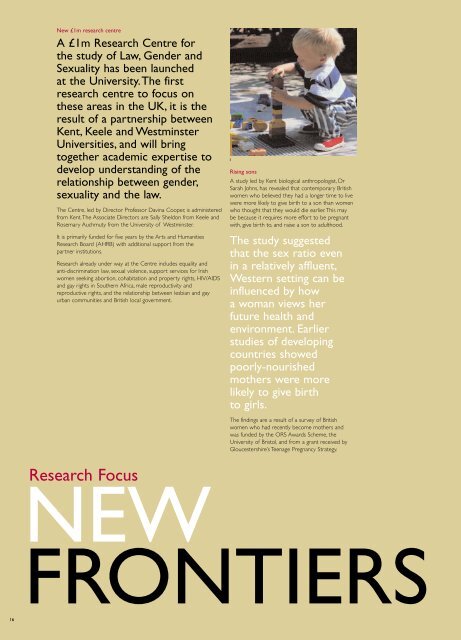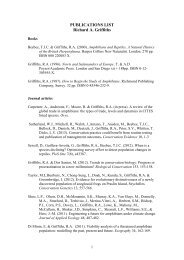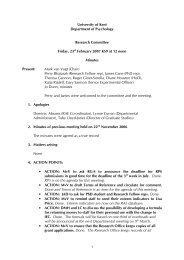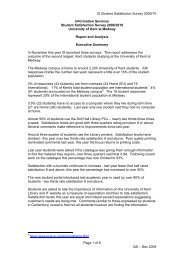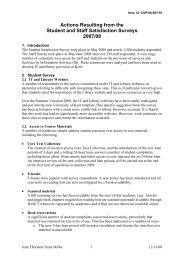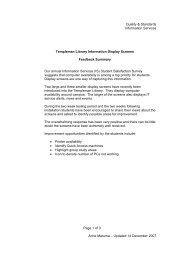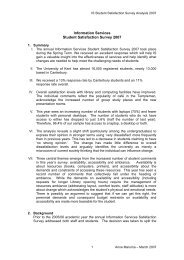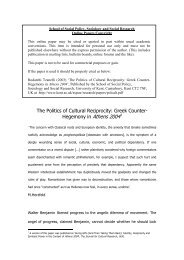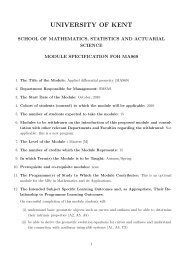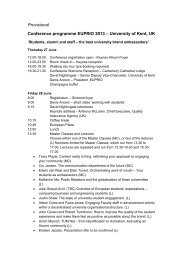KENT MAGAZINE AW - University of Kent
KENT MAGAZINE AW - University of Kent
KENT MAGAZINE AW - University of Kent
You also want an ePaper? Increase the reach of your titles
YUMPU automatically turns print PDFs into web optimized ePapers that Google loves.
New £1m research centre<br />
A £1m Research Centre for<br />
the study <strong>of</strong> Law, Gender and<br />
Sexuality has been launched<br />
at the <strong>University</strong>.The first<br />
research centre to focus on<br />
these areas in the UK, it is the<br />
result <strong>of</strong> a partnership between<br />
<strong>Kent</strong>, Keele and Westminster<br />
Universities, and will bring<br />
together academic expertise to<br />
develop understanding <strong>of</strong> the<br />
relationship between gender,<br />
sexuality and the law.<br />
The Centre, led by Director Pr<strong>of</strong>essor Davina Cooper, is administered<br />
from <strong>Kent</strong>.The Associate Directors are Sally Sheldon from Keele and<br />
Rosemary Auchmuty from the <strong>University</strong> <strong>of</strong> Westminster.<br />
It is primarily funded for five years by the Arts and Humanities<br />
Research Board (AHRB) with additional support from the<br />
partner institutions.<br />
Research already under way at the Centre includes equality and<br />
anti-discrimination law, sexual violence, support services for Irish<br />
women seeking abortion, cohabitation and property rights, HIV/AIDS<br />
and gay rights in Southern Africa, male reproductivity and<br />
reproductive rights, and the relationship between lesbian and gay<br />
urban communities and British local government.<br />
1<br />
Rising sons<br />
A study led by <strong>Kent</strong> biological anthropologist, Dr<br />
Sarah Johns, has revealed that contemporary British<br />
women who believed they had a longer time to live<br />
were more likely to give birth to a son than women<br />
who thought that they would die earlier.This may<br />
be because it requires more effort to be pregnant<br />
with, give birth to, and raise a son to adulthood.<br />
The study suggested<br />
that the sex ratio even<br />
in a relatively affluent,<br />
Western setting can be<br />
influenced by how<br />
a woman views her<br />
future health and<br />
environment. Earlier<br />
studies <strong>of</strong> developing<br />
countries showed<br />
poorly-nourished<br />
mothers were more<br />
likely to give birth<br />
to girls.<br />
The findings are a result <strong>of</strong> a survey <strong>of</strong> British<br />
women who had recently become mothers and<br />
was funded by the ORS Awards Scheme, the<br />
<strong>University</strong> <strong>of</strong> Bristol, and from a grant received by<br />
Gloucestershire’s Teenage Pregnancy Strategy.<br />
Research Focus<br />
NEW<br />
FRONTIERS<br />
16


